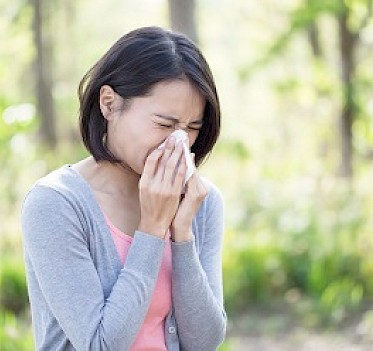Hey There, Hay Fever
Allergic Rhinitis, better known as hay fever or severe seasonal allergies, has us questioning if the colorful blossoms, green grass and trees are worth it. Seasonal changes and hay fever almost seem to be a package deal, but what exactly is hay fever? Well, look no further, because HealthCARE Express has the answers you’ve been looking for.
Goodbye Cold, Hello Allergy Season
It never fails that regardless if the groundhog sees its shadow or not, pollens and other allergens seem to get the better of us at the same time every year. Starting in March and going until May for most, hay fever is at its high. Allergies are caused by an irritation within your immune system which results in your immune system fighting back. But let’s break it down, take sneezing for example. You know that feeling you get in your nose when you breathe in and your nose gets a tickle, causing you to sneeze? That’s your immune system thinking there is an intrusion in the body and its way of trying to protect itself is by releasing histamine into your bloodstream, or in other words, a natural chemical. Histamine causes your nose to run, and your eyes and throat to become itchy and sometimes inflamed, all in attempts to eject the allergen. Obviously, this is a good thing for times when there is actually something that could harm your immune system, but most of the time your immune system is overreacting. Typically harmless things like grass, trees, pollen, etc. confuse your immune system into thinking your body is under attack, causing all of the hay fever symptoms that keep tissue companies operating.
Allergy Season Symptoms
Allergies are inherited, so if a member of the family has bad allergies, chances are, you will too (thanks, dad). Also, people with asthma or eczema tend to get the worst of hay fever so if you know someone with either of those, maybe bring them a box of Claritin as a peace offering.
Symptoms Of Hay Fever Include:
- Itchy Eyes
- Sneezing
- Nasal Congestion
- Nose Irritation
- Scratchy Throat
- Mouth Irritation
- Wheezing, Coughing, or Trouble Breathing
- If you’re worried about whether or not you have hay fever, remember that it could just be your system overreacting, but it's always better to be safe than sorry
See A Doctor About Hay Fever If:
- Your hay fever does not go away after a few weeks
- Your hay fever is interfering with your everyday routine
- Your over the counter medicine doesn’t seem to be working
- You have a weakened immune system, asthma, eczema, or other medical conditions
Home Remedies And Other Solutions
During the months when seasons change, there is an inevitable increase in pollen, mold, dust, and other allergens. The first step in getting rid of hay fever is to find out what you’re allergic to. Prick and intradermal skin tests are the norms for suspected seasonal, environmental, stinging insects, food, and medication allergies as they will specifically identify the underlying allergy within 15-30 minutes of test initiation. However, many clinics may still offer an immunoglobulin E (IgE) test, which is a blood test that has the ability to detect any and all allergies.
Solutions For Hay Fever Symptoms
- Antihistamine pills
- Nasal spray
- Eye drops
- Nose drops
These are medication-based solutions. There are both over-the-counter and prescription variations available depending on your symptoms. Providers at Healthcare Express are a great resource for specific recommendations and treatment for allergy symptoms.
Home Remedies for Hay Fever Symptoms
- Take a spoonful of honey every day
- Make sure to have enough Vitamin C (a natural antihistamine)
- Eat a couple of red peppers to clear your sinuses
- Chamomile tea
- Add garlic to your diet
- Throw in extra fruit and veggies to your diet too, for good measure
- Lather your nose in vaseline and it will act as a fly trap, but for pollens
More Simple Ways To Prevent Hay Fever Include:
- Avoid touching your face and/or nose
- Wash your hands regularly
- Get dust mite covers for your pillows and mattress
- Invest in an air-purifying device
- Try to keep your doors and windows closed so that pollens can’t enter your home as easily
- Stay strapped with nasal spray, eye drops, and other medications to help you get through your day
HealthCARE Express Can Help With Hay Fever
Hay fever, nay fever. Here at HealthCARE Express we have experienced hay fever and know how to help you. If you’re at your wits end, can’t figure out what it is you’re allergic to exactly, need prescribed medication, or even just want to chat about your health in general, then our urgent care is here for you. We have several different locations and each location we are equipped with trained professionals, supplies and medications that can help you and all your medical needs. For any further questions or concerns, reach out to us by email, over the phone, or even in person and we guarantee that you’ll get the medical attention that you need.
